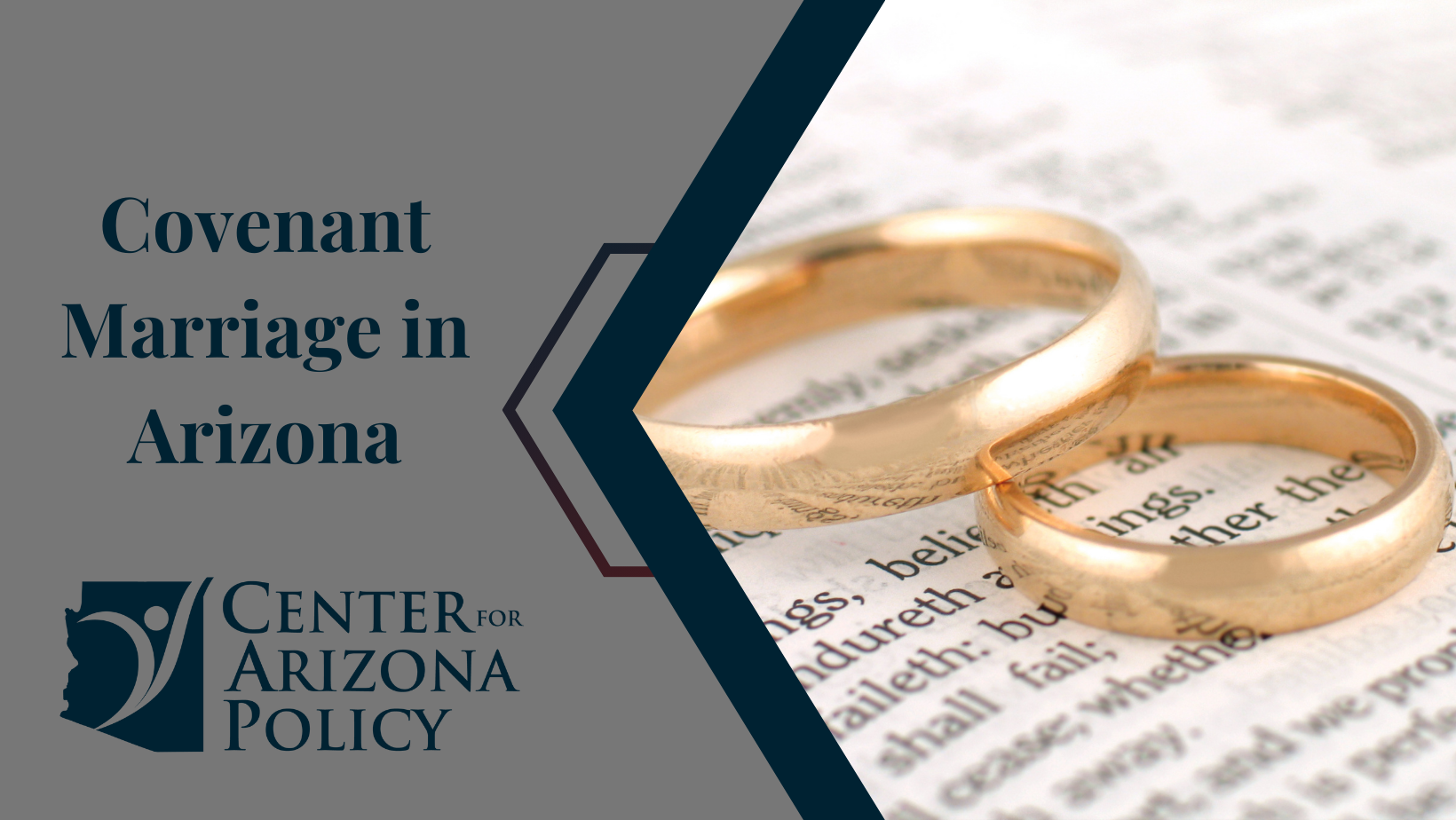Covenant Marriage in Arizona
Covenant Marriage in Arizona In the News

Overview
Before being forcibly redefined by the U.S Supreme Court, the institution of marriage was devalued and attacked for decades by no-fault divorce, out-of-wedlock births, and the creation of marriage counterfeits. Covenant marriage offers an opportunity for couples to demonstrate their commitment to the original intent of marriage as being a lifelong, faithful relationship between one man and one woman. The state of Arizona officially recognized covenant marriages after a Center for Arizona Policy (CAP)-supported bill was passed into law in 1998.
Talking Points
- Covenant marriage is a powerful public declaration of a couple’s commitment to the true definition of marriage and to each other. Despite the Supreme Court’s ruling that imposed same-sex marriage on America, covenant marriage allows couples to demonstrate their commitment to marriage as the lifelong, faithful union between one man and one woman.
- The government has a legitimate interest in strengthening marriage. Covenant marriage serves to bolster the institution.
Analysis
Arizona’s covenant marriage law allows a man and a woman planning to wed in Arizona to voluntarily strengthen their marriage vows by agreeing to premarital counseling and a stronger commitment to the marriage relationship. The law also allows married couples to convert their existing marriage to a covenant marriage.
Three principal features of a covenant marriage are:
- Engaged couples must participate in premarital counseling prior to their marriage ceremony.
- Together, the couple signs a declaration that marriage is a covenant between a man and a woman who agree to live together as husband and wife as long as they both live. The text of the declaration is set forth in statute and is provided to the couple by the county clerk when applying for a covenant marriage.
- The grounds for divorce are limited, and couples commit to seek counseling before filing for divorce.
With premarital counseling to help the couple prepare for marriage, marital counseling in the event the couple faces difficulties, and limited reasons for divorce, covenant marriage is designed to strengthen marriages and families.
Anecdotal evidence suggests that couples who go through premarital counseling have a 30% higher marriage success rate than those who decided against it.[i] Premarital counseling serves as the best insurance policy for a lasting marriage regardless of the couple’s religious background.[ii] Couples who go through premarital counseling are significantly better off in their marriages than those who do not.[iii]
Covenant marriage is purely voluntary and is not restricted to religious couples. A couple who chooses a covenant marriage can be married in church by a pastor, priest, or rabbi or in a civil ceremony by a judge. Premarital counseling may be given by clergy or by non-religious licensed counselors.
Getting a Covenant Marriage License
An engaged couple seeking a covenant marriage must:
- Complete premarital counseling with a clergy member or a marriage counselor.
- Have a clergy member or a marriage counselor provide a notarized affidavit that the statutory requirements for premarital counseling have been met. (Sample affidavits are available at https://www.azcourthelp.org/finder/family/marriage/156-covenant-marriage-affidavit.)
- Take the notarized affidavit to the Clerk of the Superior Court in your county (the same place you would get a regular marriage license) and complete the “Declaration of Intent to Enter into a Covenant Marriage” form. The cost is $83[iv] (the same amount as a regular marriage license).
A married couple who wants to convert their existing marriage into a covenant marriage only needs to complete the declaration form with the clerk of the court. The cost for converting their license is $30.[v]
Covenant Marriage and Divorce
Covenant marriage does not eliminate no-fault divorce. Married couples and those who choose not to enter into a covenant marriage remain under the no-fault divorce system. However, couples who choose to commit to each other through covenant marriage are only permitted to divorce in specific circumstances. Thus, covenant marriage is one way to decrease the prevalence of unilateral divorces, in which one spouse does not want the marriage to end.
A couple with a covenant marriage may obtain a legal separation for any one of these reasons:[vi]
- Adultery.
- Felony imprisonment.
- Abandonment for one year.
- Physical, sexual, or emotional abuse or domestic violence.
- Living separate and apart for two years.
- Habitual intemperance or ill treatment renders living together insupportable.
- Habitual abuse of drugs or alcohol.
As with legal separation of any marriage, the court may issue temporary support orders for a spouse who has been abandoned before the one-year time period is complete or for separated spouses before the two-year time period is complete.
A couple may obtain a divorce from a covenant marriage for any of the reasons for legal separation listed above (apart from number 6) for any of the following:
- Living separate and apart for one year after an order of legal separation is entered.
- Husband and wife mutually agree to dissolve covenant marriage.
For more information, access the Arizona Supreme Court’s pamphlet “Covenant Marriage in Arizona” at www.azcourts.gov/Portals/31/Other DR/covenant.pdf.
Conclusion
Covenant marriage is designed to strength marriage in Arizona. Adopting a deeper level of commitment in marriage is a choice left to individual couples. None of the provisions of the covenant marriage law coerce couples to make a covenant agreement. If a couple wishes to pursue a deeper level of commitment in their marriage, it is their choice, and the law will affirm their vows.
[i]Lombardo, C. (2018, August 3). 20 Significant Premarital Counseling Statistics. Health Research Funding. https://healthresearchfunding.org/20-significant-premarital-counseling-statistics/ .
[ii] Seth Meyers, Benefits of Pre-Marital Counseling: Successful Marriage, Psychology Today, Sep. 21, 2011, available at https://www.psychologytoday.com/blog/insight-is-2020/201109/benefits-pre-marital-counseling-successful-marriage.
[iii] DSW, S. J. B. (2022, June 11). 4 reasons to get premarital counseling. Psychology Today. https://www.psychologytoday.com/us/blog/magnetic-partners/202206/4-reasons-get-premarital-counseling
[iv] Aboykins. (2019). Covenant Marriage License Requirements, AZ. U.S. Marriage License Laws. https://www.usmarriagelaws.com/marriage-license/arizona/covenant-marriage/covenant-requirements/
[v] Marriage Licenses | Maricopa County Clerk of Superior Court. (n.d.). https://www.clerkofcourt.maricopa.gov/records/marriage-licenses-passports/marriage-licenses
[vi] Ariz. Rev. Stat. §§ 25-903 and 25-904.
